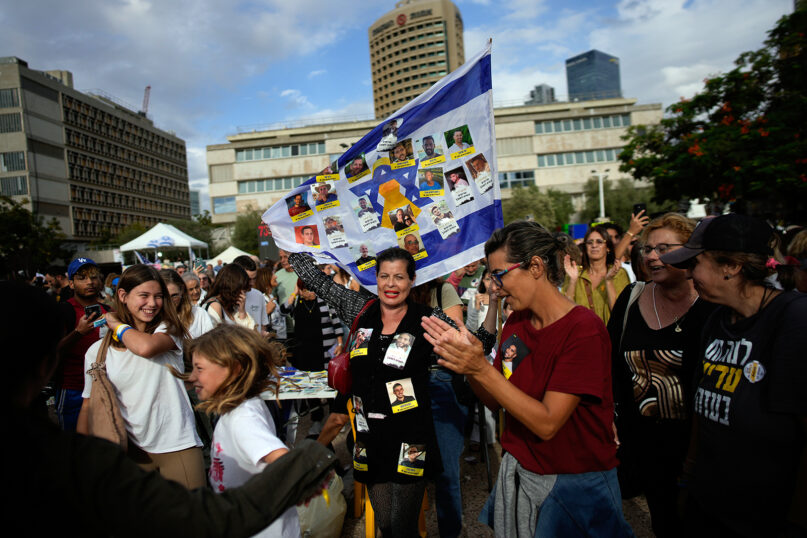(RNS) — As the first phase of a ceasefire between Israel and Gaza appeared imminent, major religious groups, Jewish, Muslim and Christian, issued near-unanimous statements of relief and gratitude. But they also tempered their statements with notes of caution.
“While we’re all celebrating the immediate win,” said Jeremy Ben-Ami, the president of J Street, the liberal pro-Israel advocacy group, “to really have a long-run success here is going to require probably not just months but years of work ahead. It’s going to take real dedication. So, we’re cautious and optimistic at the same time.”
The exchange of hostages and prisoners and end to military hostilities, brokered by U.S. President Donald Trump over the past week, is expected to be ratified on Thursday (Oct. 9) in a vote by Israel’s Cabinet. If the Cabinet approves the deal, it would end two years of devastating bloodshed and free some 20 living hostages still held by Hamas in Gaza.
Jewish organizations and leaders from around the world celebrated what they hoped were the first steps toward ending the war permanently, including the American Jewish Committee, the Jewish Council for Public Affairs, the National Council of Jewish Women, the Anti-Defamation League, the Conservative and Reform movements, the Board of Deputies of British Jews and the World Jewish Congress, among many others.
American Jews have been torn apart by the Israeli-Palestinian conflict since the Oct. 7, 2023, attack in which Hamas infiltrated Israel, killing about 1,200 people and taking about 250 hostage. Most sharply disapproved of Israel’s retaliatory incursion in Gaza, according to surveys. A recent Washington Post poll that found 61% believed Israel had committed war crimes.
According to Gazan officials, the Israeli military has killed more than 67,000 Palestinians, the vast majority of them women and children, and its chokehold on the coastal strip has provoked a massive humanitarian crisis, including starvation.

People react as they celebrate after the announcement that Israel and Hamas have agreed to the first phase of a peace plan to pause the fighting, at a plaza known as Hostages Square in Tel Aviv, Israel, Oct. 9, 2025. (AP Photo/Ohad Zwigenberg)
American Muslims have sided with Palestinians and are highly critical of the war and the United States’ support for it. A Pew poll last year showed only 6% of American Muslim adults believed that the U.S. was striking the right balance between the Israelis and Palestinians. The issue became a top policy concern for many Muslim Americans who were critical of both the Biden and Trump administrations for arming Israel with billions of dollars in military aid.
The Israel-Gaza war has not only been a foreign policy issue for Muslim Americans, who have seen members of their community detained for speaking out against the war and expressing pro-Palestinian sentiment. It has also become a domestic issue involving the First Amendment cause.
“There’s even higher levels of exhaustion and worry for our communities than immediately following 9/11,” said Haris Tarin, vice president of policy and programming at the Muslim Public Affairs Council.
The Council on American-Islamic Relations on Thursday welcomed the announcement of agreement on the first phase of a new ceasefire deal.
“The world must ensure that the next stages of this agreement lead to the reconstruction of Gaza free from Israeli occupation or Western colonial oversight, as well as a clear path to ending the broader occupation and oppression of the Palestinian people so that a just, lasting peace can be established,” the statement from CAIR Executive Director Nihad Awad said.
While celebrating the deal, Muslims voiced mistrust of Israel’s intentions. “Many members of the community are viewing this deal with a great deal of caution and skepticism because promises have been made before, and have been broken by Israel and Prime Minister (Benjamin) Netanyahu, especially regarding the actual cessation of violence and the allowance of aid to enter,” said Dalia Mogahed, a researcher with the Muslim-led Institute for Social Policy and Understanding in Washington, D.C.
The question of the Israeli government’s reliability was also raised by Tarin. “The challenge is that there’s not a lot of trust in the Netanyahu government in actually fulfilling their end of the commitment,” he said.
A new ISPU poll of the American Muslim community to be released later this month, Mogahed said, shows that American Muslim and American Jewish attitudes toward the war and the rights of Palestinians are indistinguishable when it comes to the war in Gaza.
Christians groups also saluted the news of a deal.
The National Religious Broadcasters, representing a wide swath of U.S. evangelicals, hailed the agreement and congratulated Trump for pushing it forward.
“We call upon the entire Church — across the United States and around the world — to stand in steadfast prayer: that this ceasefire holds, that all hostages are safely returned, that further phases of the agreement are honored, and that this agreement will open the door to enduring peace, justice, and security for both Israel and her neighbors,” an NRB statement said.
“For sure, there will be other obstacles,” said Catholic Cardinal Pierbattista Pizzaballa, the Latin Patriarch of Jerusalem. “But now we have to rejoice about this important step that will bring a little more trust for the future and also bring a new hope, especially to the people, both Israeli and Palestinians.”



